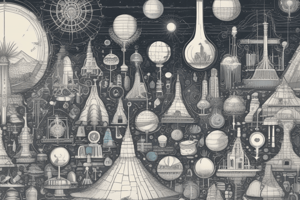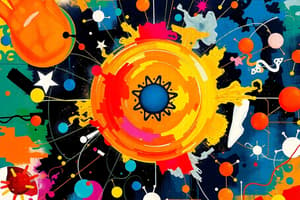Podcast
Questions and Answers
A hypothesis must be based on scientific knowledge.
A hypothesis must be based on scientific knowledge.
True (A)
A scientific theory is a guess about how or why something happens.
A scientific theory is a guess about how or why something happens.
False (B)
Scientists make predictions that tell what will happen under any and all conditions.
Scientists make predictions that tell what will happen under any and all conditions.
False (B)
The scientific method includes the steps involved in a scientific investigation.
The scientific method includes the steps involved in a scientific investigation.
"Did life on Earth evolve over time?" This question can be answered scientifically.
"Did life on Earth evolve over time?" This question can be answered scientifically.
Scientific experiments are performed under controlled conditions.
Scientific experiments are performed under controlled conditions.
Scientists can study all aspects of the natural world, including experimenting on an extinct animal.
Scientists can study all aspects of the natural world, including experimenting on an extinct animal.
Communicating your results allows others to test your hypothesis.
Communicating your results allows others to test your hypothesis.
Experimental evidence that agrees with your prediction falsifies your hypothesis.
Experimental evidence that agrees with your prediction falsifies your hypothesis.
The first step in a scientific investigation is always to develop a hypothesis.
The first step in a scientific investigation is always to develop a hypothesis.
Scientists gradually build an increasingly accurate and detailed understanding of the natural world.
Scientists gradually build an increasingly accurate and detailed understanding of the natural world.
Newton discovered the law of gravity when an apple fell from a tree and hit him on the head.
Newton discovered the law of gravity when an apple fell from a tree and hit him on the head.
Scientific evidence is any type of data that may either agree or disagree with a prediction.
Scientific evidence is any type of data that may either agree or disagree with a prediction.
Scientific theories are broad explanations that are widely accepted as true.
Scientific theories are broad explanations that are widely accepted as true.
Assumptions scientists make include:
Assumptions scientists make include:
A hypothesis:
A hypothesis:
A scientific theory:
A scientific theory:
Which is the correct order in a scientific investigation?
Which is the correct order in a scientific investigation?
To test a hypothesis:
To test a hypothesis:
An scientific experiment:
An scientific experiment:
Food chains are scientific models that:
Food chains are scientific models that:
Science cannot answer all questions.
Science cannot answer all questions.
Flashcards
Scientific Hypothesis
Scientific Hypothesis
A testable statement that suggests an explanation for a phenomenon, based on existing knowledge. It can be proven false.
Scientific Theory
Scientific Theory
A well-substantiated explanation of some aspect of the natural world, supported by a large body of evidence.
Scientific Method
Scientific Method
A systematic approach to investigating a question or phenomenon, involving observation, questioning, hypothesis formation, testing, and analysis.
Observation in Scientific Method
Observation in Scientific Method
Signup and view all the flashcards
Predictions in Scientific Method
Predictions in Scientific Method
Signup and view all the flashcards
Controlled Conditions in Experiment
Controlled Conditions in Experiment
Signup and view all the flashcards
Sharing Scientific Results
Sharing Scientific Results
Signup and view all the flashcards
Supporting Evidence
Supporting Evidence
Signup and view all the flashcards
Conflicting Evidence
Conflicting Evidence
Signup and view all the flashcards
Progressive Understanding of Nature
Progressive Understanding of Nature
Signup and view all the flashcards
Evolution as a Scientific Theory
Evolution as a Scientific Theory
Signup and view all the flashcards
Limitations of Science
Limitations of Science
Signup and view all the flashcards
Science and Belief Systems
Science and Belief Systems
Signup and view all the flashcards
Scientific Models
Scientific Models
Signup and view all the flashcards
Food Chains
Food Chains
Signup and view all the flashcards
Steps in Scientific Investigation
Steps in Scientific Investigation
Signup and view all the flashcards
Predictions in Scientific Investigations
Predictions in Scientific Investigations
Signup and view all the flashcards
Assumptions in Science
Assumptions in Science
Signup and view all the flashcards
Changeable Nature of Scientific Knowledge
Changeable Nature of Scientific Knowledge
Signup and view all the flashcards
Characteristics of a Scientific Hypothesis
Characteristics of a Scientific Hypothesis
Signup and view all the flashcards
Characteristics of a Scientific Theory
Characteristics of a Scientific Theory
Signup and view all the flashcards
Study Notes
Scientific Hypothesis and Theory
- A hypothesis must be grounded in scientific knowledge and can be proven incorrect.
- A scientific theory is an explanation based on substantial evidence, contrasting with a mere guess.
Scientific Method
- The scientific method includes systematic steps such as observation, questioning, forming hypotheses, and testing them.
- The first step in scientific investigation involves making observations rather than jumping straight to a hypothesis.
Predictions and Experimental Conditions
- Scientists cannot predict outcomes under all conditions; predictions are generally based on specific scenarios.
- Scientific experiments must be conducted under controlled conditions to ensure accuracy and reliability.
Communication and Evidence
- Sharing results allows peer testing of hypotheses and fosters scientific discourse.
- Evidence that aligns with predictions supports a hypothesis, while conflicting data may lead to falsification.
Understanding Natural World
- Scientists progressively advance their understanding of natural phenomena through ongoing research and refinement of theories.
- The statement that life on Earth evolved over time can be examined using scientific methodologies.
Limitations of Science
- Not all aspects of the natural world can be tested experimentally; extinct species, for example, cannot be subject to modern experiments.
- Science cannot provide answers to all inquiries, especially those related to belief systems.
Scientific Models and Food Chains
- Food chains serve as simplified scientific models, aiding in the comprehension of interactions within ecosystems.
Steps of Scientific Investigations
- A proper sequence in scientific investigations involves making observations, posing questions, forming a hypothesis, and conducting tests.
- Predictions play a crucial role before testing a hypothesis.
Core Principles of Science
- Fundamental assumptions in science include the idea that nature can be understood through systemic study, and that scientific ideas are subject to change based on new evidence.
Studying That Suits You
Use AI to generate personalized quizzes and flashcards to suit your learning preferences.




